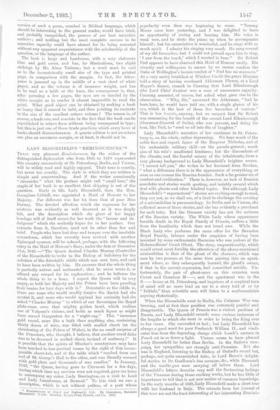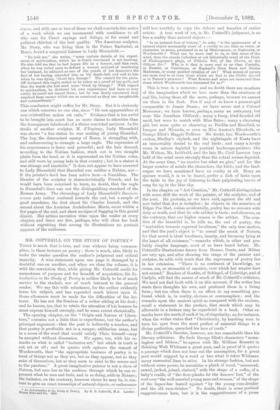LADY BLOOMFIELD'S "REMINISCENCES."`
THESE very pleasant _Reminiscences, by the widow of the distinguished diplomatist who from. 1845 to 1870 represented this country successively at St. Petersburg, Berlin, and Vienna, will be widely read and highly enjoyed. Their tone is courtly, but never too courtly. The style in which they are written is simple and unpretending. And if the writer occasionally " chronicles " what the profane might tall " small beer," the staple of her book is so excellent that skipping is out of the question. Early in life, Lady Bloomfield, then the Hon. Georgiana Liddell, was appointed a Maid of Honour to her Majesty. Far different was her lot from that of poor Miss Barney. The devoted affection which she expresses for her mistress was evidently as well deserved as it was deeply felt, and the description which she gives of her happy bondage will of itself secure for her work the " favour and in- dulgence" which she modestly hopes for in her preface. Our extracts from it, therefore, need not be other than few and brief. People who have lost time and temper over the insoluble conundrum, which has recently been revived with another Episcopal sponsor, will be solaced, perhaps, with the following entry in the Maid of Honour's diary, under the date of December 31st, 1812 The Queen desired Charles Murray (Controller of the Household) to write to the Bishop of Salisbury for the solution of the detestable riddle which was sent here, and said to have been written by Min. He answers that the whole thing is perfectly untrue and unfounded ; that he never wrote it, or offered any reward for its explanation ; and he believes the whole thing to be a hoax. I expect the Queen will be very angry, as both her Majesty and the Prince have been puzzling their brains for four days with it." Detestable as the riddle is, there are some who would readily forgive the diarist had she quoted it, and more who would applaud her curiosity had she asked "Charles Murray " to which of our Sovereigns the Royal plate-room owes that mighty golden bowl, which realises One of Volpone's visions, and holds as much liquor as might have served Gargantua for a " night-cap." This " immense gold vessel, more like a bath than anything else, containing thirty dozen of wine, was filled with mulled claret (at the christening of the Prince of Wales), to the no small surprise of the Prussians, who thought, I "believe, that another royal duke was to be drowned iu mulled claret, instead of malmsey !" It is possible that the spirits of Blucher's countrymen may have been touched to less poetical issues by the sight of this incom- parable claret-tub, and of the table which "reached from one end of St. George's Hall to the other, and was literally covered with gold plate and thousands of wax candles." In January, 184, "the Queen, having gone to Clermont for a few days, during which time my services were not required, gave me leave to accompany my sister, Lady Barrington, on a visit to Lord and Lady Lansdowne, at Bowood." To this visit we owe a description, which is not without pathos, of a poet whose * Reminiscences of Court and Diptomettio Life. B Georuiana, Baroness Blom/Aka 2 vols. London: Kogan Paul, Trenon, and Co. 1883. popularity even then was beginning to wane. "Tommy Moore came here yesterday, and I was delighted to have an opportunity of seeing and hearing him. His voice is weak now, and he shuts the piano up when he accompanies himself ; but his enunciation is wonderful, and he sings with so much spirit. I admire his singing very much. He sang several of my old favourites, but I could not prevail upon him to sing, I saw from the beach,' which I wanted to hear." Sir Robert Peel appears to have charmed this Maid of Honour vastly. His vivacity and willingness to amuse by no moans confirm the Duke of Wellington's laconic verdict of " Peel has no manners." At a very merry breakfast at Windsor Castle the grave Minister told a story of having overheard Alderman Flower, at a Lord Mayor's dinner, remark to Canning that Lord Ellenborough (the Lord Chief Justice) was a man of uncommon sagacity. Canning assented, of course, but asked what gave rise to the- observation. " Why, Sir," auswered the Alderman, "had he been here, he would have told me, with a single glance of his eye, which is the best of those five haunches of venison."' This is Sea trovaio, anyway, but we suspect that Sir Robert was romancing for the benefit of the second Lord Ellenborough (Governor-General of India), who was present, and doing his best, like Peel, to "send us all into fits of laughter."
Lady Bloomfield's narrative of her residence in St. Peters- burg is, on the whole, rather depressing. We hear much of the noble face and superb figure of the Emperor Nicholas, and of his undeniable military skill—on the parade-ground ; much also of his wife's unaffected kindness ; but the discomforts of the climate, and the fearful misery of the inhabitants, form a very gloomy background to Lady Bloomfield's brighter scenes. "1 cannot tell you," she writes to her husband from Breslau, " what a difference there is in the appearance of everything, as soon as one crosses the Russian frontier. Such a far greater air of comfort and civilisation." There is, however, no lack of Russian anecdotes and stories worth quoting, and notably several which deal with ghosts and other kindred topics. But although Lady Bloomfield's " supernatural " stories are exciting enough to read, they are not, as we shall see, of a kind to challenge the scrutiny of a minimifidian in pneumatology. In Berlin and in Vienna, she collected more of these stories, and she has evidently a penchant for such tales. But the German variety has not the eeriness of the Russian variety. The White Lady whose appearance heralds death in the Royal Family of Prussia, suffers a little from the familiarity which does not breed awe. While the Black Lady who performs the same office for the Bavarian Royal Family, labours under the suspicion of having been invented by some enthusiastic Bavarian who was jealous of the Hohenzollerns' Court Ghost, The story, unquestionably, which would arrest most forcibly the attention of the above-mentioned miuimifidian is that of the ghost of the cliassear, which was seen by two persons at the same time passing into an apart- ment where, as they subsequently learned, the ghost's owner, if that be the correct expression, had committed suicide. Un- fortunately, the pair of ghost-seers on this occasion were Count and Countess M—, and the apartment was in the S— house at St. Petersburg, and inquirers of a sceptical tarn of mind will no more lead an ear to a story told of or by
than scientific men will listen to a mathematician arguing rhetorically.
When the Bloomfields went to Berlin, the Crimean War was. brewing, and at first their position was extremely painful and disagreeable. The Queen of Prussia was a violent partisan of Russia, and Lady Bloomfield records some curious instances of the lengths to which she went in order to bring the King over to her views. She succeeded at last ; but Lady Bloomfield has always a good word for poor Frederick William II., and vindi- cates him from the degrading charge which Leech's cartoon in Punch set in so fierce a light. Vienna seems to have pleased Lady Bloomfield far better than Berlin. In the Sadowa cam- paign. her sympathies are strongly anti-Prussian. But she was in England, listening to the Bishop of Oxford's round but, perhaps, not quite unvarnished tales, to Lord Rosse's delight- ful stories, to Dr. Goulburn's fine sermons, &c., while Bismarck and the needle-gun were carrying all before them. Lord Bloomfield's letters describe very well the fluctuating feelings of the Viennese during those exciting weeks, but he has little of importance to tell that is not now matter of common knowledge. In the early months of 1868, Lady Bloomfield made a short tour with her husband in Italy. The extracts from her journal of this tour are not the least interesting of her interesting Reminis•
cencee, and with one or two of these we shall conclude this notice
of a work which we can recommend with confidence to all who care for Court sayings and doings, or for social and political chitchat of the best quality. The American sculptor, Mr. Story, who was living then in the Palace Barberini, at Rome, found a congenial listener in Lady Bloomfield
" He told me," she writes, " some curious details of his experi- ences of spiritualism, which he is firmly convinced is not humbug. lie also told me that be bad begun life as a lawyer, and that once, when he was called upon to defend a woman accused of murdering her husband, he adduced as one of the proofs of her innocence the fact of her having attended him on his death-bed, and said to him when he was dying, ' Good.bye, George!' The council for the plain- tiff declared this ought rather to be taken as a proof of her guilt, and that the words she had used were Good, by George I' With regard to spiritualism, he declared his own experiences had been so very awful. he could not repeat them; but he was firmly convinced they resulted from causes which are as unnatural as they are inexplicable and extraordinary."
This conclusion might suffice for Mr. Story. But it is obviously one which concerns no one else, since " De non apparentibus et non existentibus eadem est ratio." Evidence that is too awful to be brought into court has no more claims to attention than the transparent falsehoods of a thrice convicted perjurer. In the studio of another sculptor, M. d'Espinay, Lady Bloomfield was shown " a fine statue he was making of young Hannibal. The boy, the determined enemy of Rome, is struggling with, and endeavouring to strangle a large eagle. The expression of his countenance is fierce and powerful; and the hair dressed, according to the Nubian fashion, stuck out in two straight plaits from the head, as it is represented on the Nubian coins, and still worn by young lads in that country ; but in a statue it was strange and inartistic." It does not appear to have occurred
to Lady Bloomfield that Hannibal was neither a Nubian, nor—
if the printer's devil has been active here—a Nurnidian. The blunder of the sculptor is characteristically French, and he
would have been surprised to learn, no doubt, that the eagle in Hannibal's time was not the distinguishing standard of the Roman Army. The chronology of Lady Bloomfield's Reminie- CenCe8 gets rather confused towards the end, but a couple of good anecdotes, the first about Sir Charles Locook, and the second about the Austrian Archduchess Marie, occur within a few pages of the end, and show no signs of flagging in this genial diarist. Her artless narrative wins upon the reader at every chapter, and there are few, perhaps, who will close her book without regretting that among its illustrations no portrait
appears of the authoress.







































 Previous page
Previous page